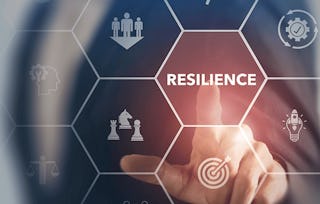Globalisation and advances in information and communication technology have resulted in a 24/7 work environment characterised by rapid change, a greater sense of competition, and an explosion in access to communication and information. These pressures compound stress related to workload and information processing – this not only reduces performance but can lead to a reduced sense of meaning and purpose as well as physical and mental health issues. Understanding stress and how to boost your resilience to it are essential skills for contemporary leaders and play a vital role in managing the demands you face at work. This course will focus on the nature of stressors facing leaders in today’s work environments and how to deal with them. You’ll explore personal resilience – your capacity to withstand and cope with stress – and strategies for self-management, motivation and organisation. You’ll also learn how resilience is impacted by health and social relationships.

Build personal resilience
Ends soon: Gain next-level skills with Coursera Plus for $199 (regularly $399). Save now.

Build personal resilience
This course is part of Adapting: Career Development Specialization

Instructor: Dr Alena Soboleva
50,506 already enrolled
Included with
(1,632 reviews)
What you'll learn
Critically evaluate the nature of work stress and approaches to manage stress
Reflect on personal sources of stress in the extent of personal resilience
Apply strategies and skills for enhancing resilience to a variety of situations when managing yourself and others
Skills you'll gain
Details to know

Add to your LinkedIn profile
1 quiz, 11 assignments
See how employees at top companies are mastering in-demand skills

Build your subject-matter expertise
- Learn new concepts from industry experts
- Gain a foundational understanding of a subject or tool
- Develop job-relevant skills with hands-on projects
- Earn a shareable career certificate

There are 6 modules in this course
As you know stress is a major problem in today’s dynamic work environment. No doubt you have experienced stress in your working life. However, you may be surprised about the extent of stress and the scale of the problems that it represents to society, organisations, and to their workforces. Stress is a problem for everyone but you will focus on stress as it applies to managers, whether they work in large or small organisations or run their own business. Today, to enhance and prosper at work, you need to develop your capacity to deal with stress and its causes, in other words to build your resilience. In Week 1 you will begin to explore the nature of stress and resilience, a big picture view of the impact of stress, and the role of contemporary forces in society on the growing problem of stress for you and for those you will work with. The guided activities, including the Habit Corner, will help you to determine your stressors, how you respond to them, and compare your approach toa model of stress and resilience.
What's included
5 videos3 readings2 assignments1 discussion prompt
From last week you will recognise that stress arises from the challenges you face in your work (and in your lives). This week, in relation to the framework of stress you will reflect on and analyse your personal work experiences to evaluate your own sources of stress. Four types of stressors will be introduced and discussed in detail. Understanding the nature of sources of stress will help you generate insights for building resilience both for you and for those you manage and work with in the future.
What's included
4 videos1 reading2 assignments
Having so far examined the sources of stressors that you are likely to have encountered and the impact or reactions to stress you'll now turn your attention to becoming more resilient to stress through the adoption of approaches to manage stress. First, you will explore whether you can eliminate stress from your life. While you may think it is impossible to eliminate stress, it is important to realise that for many people the way you structure your work environments can have a profound impact on the level of stress encountered. Why suffer if you don’t have to? Given the important insight that people can react very differently to stressful situations, you will explore how your perceptions play a role in the impact of stress you experience. You will look at a number of these perceptual aspects and consider insights that you may employ to manage your stress. Finally, you will examine how improving your skills to deal more appropriately with the demands placed upon you can have a significant impact on the experience of stress.
What's included
4 videos2 readings2 assignments
This week you will continue to explore how to build resilience by looking at a number of features of resilient people. First, you'll explore the psychological aspects of resilience – in particular, the concept of hardiness and how your emotions play a role in how well you deal with stress. In addition, you will investigate the relationship between resilience and health. You know that when you are tired or have low energy or are feeling unwell you are more likely to react poorly to stressful situations. Finally, you will examine resilience from the perspective of social connectedness. While your interactions with others can often be a source of stress, you also seek out people to share and talk to about your stress. Resilient people are typically part of social networks, family and friendship groups, that can support us in times of stress. By considering these various aspects of resilient you are able to reflect on your own resilience profile.
What's included
4 videos1 reading2 assignments
Given the pressures and demands on time, a critical skill for managers relates to how well you manage your time and personal organisation. Indeed, your ability in managing your time plays an important role in your overall level of resilience. This week you will examine your time management from the perspective of how effectively you manage yourself. Effectiveness refers to the extent that your actions link to your values and important goals. You will reflect on your work goals and values and the extent that they link with your current behaviour at work and explore ways to develop the effectiveness of your time and personal organisation.
What's included
4 videos1 reading1 quiz1 assignment
Last week’s you were introduced to the idea that you can can enhance resilience through improving your time and personal organisation skills. These skills were highlighted by ensuring that your behaviour reflects what you value and cared about. This week, you will look at time and personal organisation skills by exploring how you go about your work to ensure that it is done in the most efficient way possible. The famous American author Mark Twain once said that you should eat a live frog in the morning and then you won’t have to do anything so unpleasant for the rest of the day. Of course Mark Twain was not literally referring to eating a frog but emphasising the view that doing things you find difficult is easler first thing in the morning. This advice and many other tactics have been discussed in the time management literature as ways to enhance your behaviour in managing your time and personal organisation. This week you will explore strategies to enhance your skills in managing your time – how to do what you have to do more efficiently. You will also examine two common problems facing many people in dealing with demands on their time: the tendency to put off doing what you should be doing (i.e. procrastination) and the desire to do things perfectly (i.e. perfectionism). Finally, you will recap the course and apply the lessons to make changes to your behaviour to help build resilience.
What's included
5 videos1 reading2 assignments
Earn a career certificate
Add this credential to your LinkedIn profile, resume, or CV. Share it on social media and in your performance review.
Instructor

Offered by
Explore more from Leadership and Management
 Status: Free Trial
Status: Free Trial Status: Free Trial
Status: Free TrialMacquarie University
 Status: Free Trial
Status: Free TrialUniversity of Colorado System
 Status: Free Trial
Status: Free TrialAmerican Psychological Association
Why people choose Coursera for their career




Learner reviews
1,632 reviews
- 5 stars
87.38%
- 4 stars
10.47%
- 3 stars
1.40%
- 2 stars
0.30%
- 1 star
0.42%
Showing 3 of 1632
Reviewed on Dec 19, 2021
Сначала немного отвлекал акцент преподавателя. Курс в целом пустопорожний, вода на воде, очень скучный. Ставлю пять, чтобы Алёна в следующий раз запустила что-то поинтереснее.
Reviewed on Jul 6, 2020
This course has help me shine a light on the importance of self-awareness, and that events that cause us to stumble or discourage us are all in our control. All the tools needed to over ch
Reviewed on Aug 17, 2020
I do appreciate all lessons learned on this course, for sure I will put in practice all good advises and tools get from this course on my life in order to get a better life.

Open new doors with Coursera Plus
Unlimited access to 10,000+ world-class courses, hands-on projects, and job-ready certificate programs - all included in your subscription
Advance your career with an online degree
Earn a degree from world-class universities - 100% online
Join over 3,400 global companies that choose Coursera for Business
Upskill your employees to excel in the digital economy
Frequently asked questions
To access the course materials, assignments and to earn a Certificate, you will need to purchase the Certificate experience when you enroll in a course. You can try a Free Trial instead, or apply for Financial Aid. The course may offer 'Full Course, No Certificate' instead. This option lets you see all course materials, submit required assessments, and get a final grade. This also means that you will not be able to purchase a Certificate experience.
When you enroll in the course, you get access to all of the courses in the Specialization, and you earn a certificate when you complete the work. Your electronic Certificate will be added to your Accomplishments page - from there, you can print your Certificate or add it to your LinkedIn profile.
Yes. In select learning programs, you can apply for financial aid or a scholarship if you can’t afford the enrollment fee. If fin aid or scholarship is available for your learning program selection, you’ll find a link to apply on the description page.
More questions
Financial aid available,

